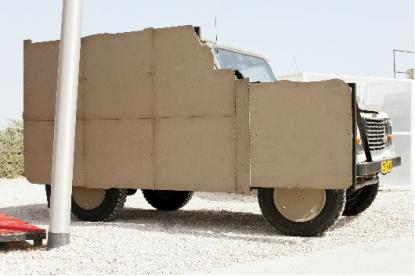2024. April 29. Monday
- Budapest
|
|
Address: 1065, Budapest Nagymező utca 8.
|
The exhibition has closed for visitors.
2015.09.04. - 2015.10.05.
Martin Kollar has spent more than a year in Israel on several visits. He was the youngest among a dozen photographers who took part in the project, where selected artists were allowed to photograph the country–and the West Bank over the wall upon the request of several photographers–without any restrictions and according to their own ideas. This experiment is comparable to the traditions of Mission Héliographique in 19th century France and Farm Security Administration project of the 20th century in the United States, where the objective was also that photographers explore the social and cultural conditions of a certain area with their pictures.

He was regularly subjected to controls on his journeys. It was thoroughly checked at every entry and exit point, what he brought in and took out of the country, what data he had on his laptop and on his external hard disks, what material residues could be found on his clothes and on his luggage. He needed a lot of permissions to take photographs and most of his requests were refused because they did not understand what and why he wanted to photograph. He was accompanied by palpable tension and paranoia everywhere. The Israeli security measures and the wall mostly remind us Eastern Europeans of the Iron Curtain, which was built to make us believe that it separated the good from the bad and defended us from the enemy.
Kollar only photographed in Israel; he did not want to compare the Israeli and the Palestine territories. He did not focus or photograph the present conflicts and he did not expose anything the authorities could have caught. His pictures do not confront the present with the history of the last century; instead, they are rather forgiving. The future is more important than the present. We are much more exposed by irony and grotesque situations than calling us to account for anything. This revelation often has a liberating force, pointing rather to the future by his intentions and looking for a lesson so that we should get on better in life. The persons in the pictures are interchangeable at will, even with us, the viewers. Their conflicts are often unpleasant because they are too close to us.
There is no viewpoint which is justifiable with photographic methods, the truth cannot be elicited. People make improvident pronouncements every day: they say about things what they are and they incessantly ascertain about this and that to be this and that. At first sight, these photos do not reflect the place where they were taken at all. Without any exceptions, these are pictures that we have never seen before about Israel. It is also difficult to decide what organising force lies behind some of them and which are only every day moments. None of these pictures are staged, while their powerfulness is in how they only show the pure and simple truth.
Curator of the exhibition: Szabolcs Barakonyi

He was regularly subjected to controls on his journeys. It was thoroughly checked at every entry and exit point, what he brought in and took out of the country, what data he had on his laptop and on his external hard disks, what material residues could be found on his clothes and on his luggage. He needed a lot of permissions to take photographs and most of his requests were refused because they did not understand what and why he wanted to photograph. He was accompanied by palpable tension and paranoia everywhere. The Israeli security measures and the wall mostly remind us Eastern Europeans of the Iron Curtain, which was built to make us believe that it separated the good from the bad and defended us from the enemy.
Kollar only photographed in Israel; he did not want to compare the Israeli and the Palestine territories. He did not focus or photograph the present conflicts and he did not expose anything the authorities could have caught. His pictures do not confront the present with the history of the last century; instead, they are rather forgiving. The future is more important than the present. We are much more exposed by irony and grotesque situations than calling us to account for anything. This revelation often has a liberating force, pointing rather to the future by his intentions and looking for a lesson so that we should get on better in life. The persons in the pictures are interchangeable at will, even with us, the viewers. Their conflicts are often unpleasant because they are too close to us.
There is no viewpoint which is justifiable with photographic methods, the truth cannot be elicited. People make improvident pronouncements every day: they say about things what they are and they incessantly ascertain about this and that to be this and that. At first sight, these photos do not reflect the place where they were taken at all. Without any exceptions, these are pictures that we have never seen before about Israel. It is also difficult to decide what organising force lies behind some of them and which are only every day moments. None of these pictures are staged, while their powerfulness is in how they only show the pure and simple truth.
Curator of the exhibition: Szabolcs Barakonyi
